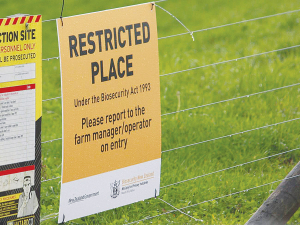We must keep our foot on the pedal
OPINION: Last week marked a major step forward in our work to eradicate Mycoplasma bovis.
 Bulk tank milk (BTM) screening results this spring – 34,853 samples tested from July 1 to September 27 – found 88 ‘detects’ so far.
Bulk tank milk (BTM) screening results this spring – 34,853 samples tested from July 1 to September 27 – found 88 ‘detects’ so far.
New Zealand's world-first Mycoplasma bovis eradication programme is making great strides but this isn't the time for complacency, says Ospri.
Bulk tank milk (BTM) screening results this spring - 34,853 samples tested from July 1 to September 27 - found 88 'detects' so far. After on-farm sampling and investigation, there have been no new confirmed cases.
Ospri told Rural News that all the indicators - from BTM screening to beef herd surveillance - gives it confidence that its 10-year programme is working.
"While there are no confirmed M. bovis cases today, we can't assume we've found all infection yet.
"Complacency now will put at risk the huge eradication effort we've all contributed to so far."
To confidently claim eradication, Ospri needs a large volume of samples over multiple years to achieve this. The programme is currently in the 'delimiting' phase.
"This means we continue to check for infection and gather data. Our national surveillance, through livestock and BTM testing, remains an important tool."
The M. bovis eradication programme started in 2018 and is expected to take 10 years. To date, 282 confirmed properties have been destocked. Almost 190,000 cattle have been culled and nearly 3000 claims have been processed. Farmers have been compensated to the tune of $290m for financial losses incurred because of programme activities. The programme has cost over $700m to date.
Ospri points out that the eradication was estimated to cost $870 million in 2018.
By comparison, it was estimated the cost of letting M. bovis spread would have been $1.3 billion in lost productivity in the first 10 years alone.
It says the programme will need ongoing funding. DairyNZ, Beef + Lamb NZ and the Government, through the Ministry for Primary Industries, provide funding.
"New Zealand's world first M. bovis eradication programme has made great strides towards being able to declare the country free from the disease," Ospri says.
"However, with a few years of work remaining, the programme will need ongoing funding - including farmer levies. Earlier this year, programme partners decreased levies significantly, and levies will continue to adjust in relation to the needs of the programme."
BMT screening will continue to play a key role in the programme. In spring, detect results rise.
"We know that our screening test has increased sensitivity during early lactation, therefore, we have an increased chance of detecting possible infection in spring," Ospri says.
"The start of the milking season is our best time to capture infection risk from milking herds returning from winter grazing and heifers entering the milking platform for the first time. Most of the confirmed properties found by BTM surveillance have been identified during the spring period.
"To confidently claim eradication, Ospri points out that it will need a large volume of samples over multiple years to achieve this," it says.
"The programme is currently in the 'delimiting' phase. This means we continue to check for infection and gather data. Our national surveillance, through livestock and BTM testing, remains an important tool."
Ospri acknowledges the impact BTM screening has on farmers and their operations.
"In the years to come, we're confident that the impact to farmers will reduce. But right now, it's too soon to say specifically what work or restrictions will decrease. We need to carefully balance the potential disruption of our work, against the risk of missing any underlying disease in the national herd."
Former Fonterra executive Alex Turnbull has been appointed CEO to lead all five Yili Oceania Business Division companies in New Zealand.
Fonterra executive René Dedoncker is leaving the co-operative later this year to lead Australian agribusiness Elders.
Alliance Group and the Southland Stags rugby team have joined forces in a partnership that will see the the meat co-operative's farmgate brand feature on players' team kits and replica jerseys.
Fonterra's plan to expand its organic programme to the South Island is being well received by farmers, the co-op says.
Voting has started for the renewal of DairyNZ's milksolids levy.
The most successful catchment groups in NZ are those that have 'a source to sea' approach.

OPINION: Here w go: the election date is set for November 7 and the politicians are out of the gate…
OPINION: ECan data was released a few days ago showing Canterbury farmers have made “giant strides on environmental performance”.